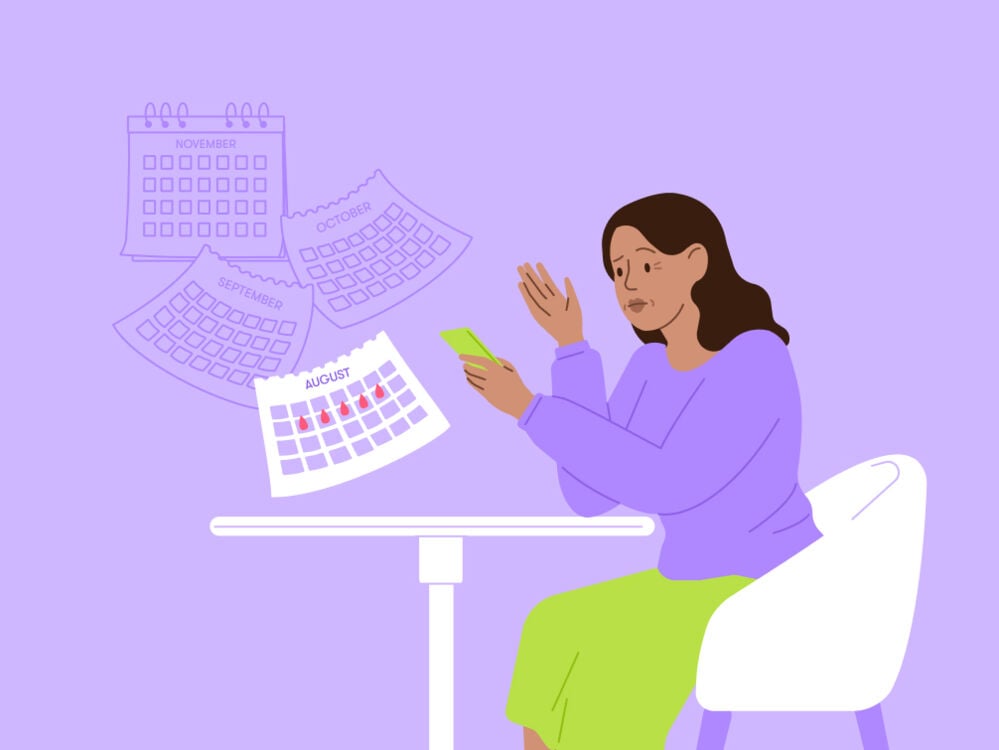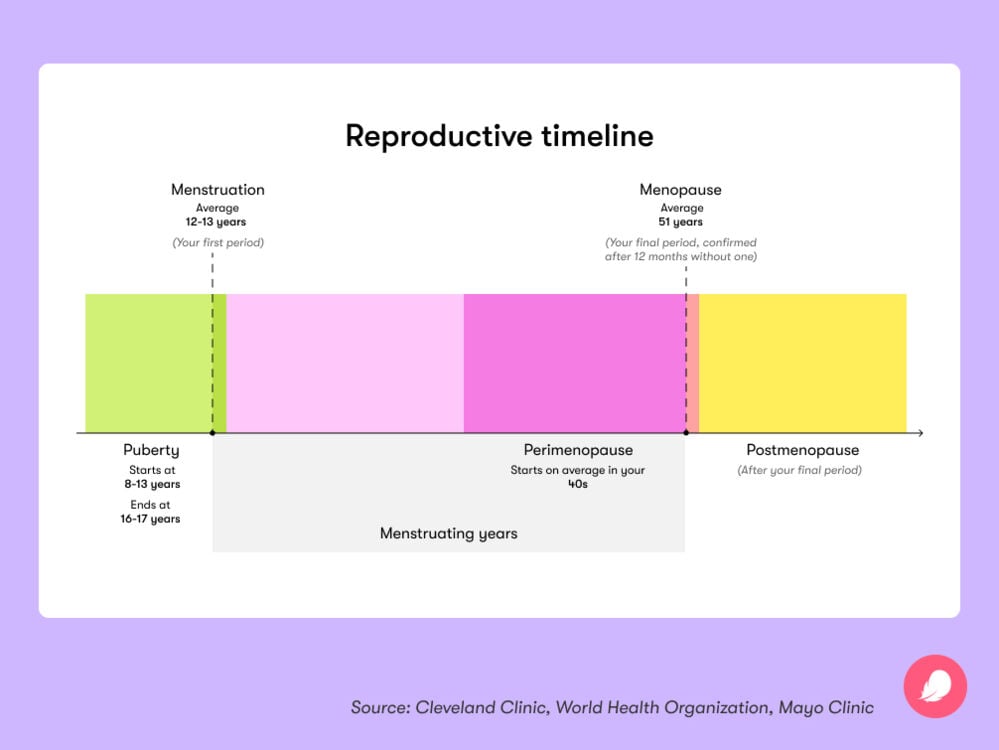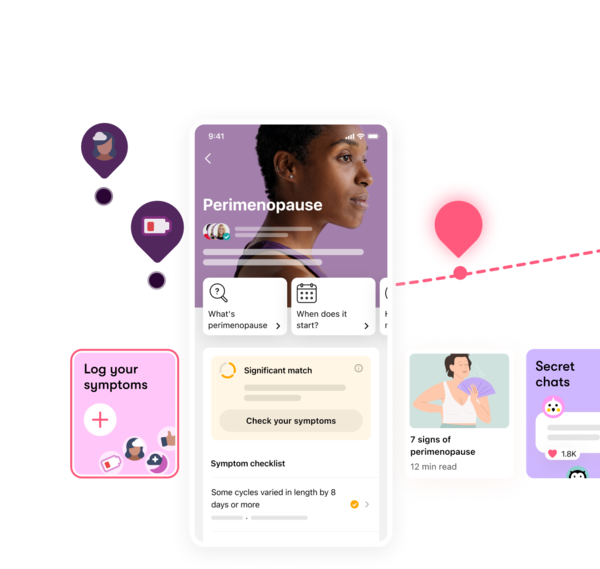It’s hard to predict when perimenopause will end, but you might start to notice some changes in your symptoms.
-
Tracking cycle
-
Getting pregnant
-
Pregnancy
-
Help Center
-
Flo for Partners
-
Anonymous Mode
-
Flo app reviews
-
Flo Premium New
-
Secret Chats New
-
Symptom Checker New
-
Your cycle
-
Health 360°
-
Getting pregnant
-
Pregnancy
-
Being a mom
-
LGBTQ+
-
Quizzes
-
Ovulation calculator
-
hCG calculator
-
Pregnancy test calculator
-
Menstrual cycle calculator
-
Period calculator
-
Implantation calculator
-
Pregnancy weeks to months calculator
-
Pregnancy due date calculator
-
IVF and FET due date calculator
-
Due date calculator by ultrasound
-
Medical Affairs
-
Science & Research
-
Pass It On Project New
-
Privacy Portal
-
Press Center
-
Flo Accuracy
-
Careers
-
Contact Us
Signs you might be reaching the end of perimenopause

Every piece of content at Flo Health adheres to the highest editorial standards for language, style, and medical accuracy. To learn what we do to deliver the best health and lifestyle insights to you, check out our content review principles.
Are you feeling like perimenopause symptoms are dragging and hoping there’s an end in sight? Not everyone struggles, but for some people, symptoms that come with perimenopause (such as irregular periods, hot flashes, brain fog, and trouble sleeping) can be difficult to live with. These changes often don’t necessarily disappear overnight when you reach menopause — some may continue on afterward since everyone’s bodies work differently. But you might be on the lookout for signs perimenopause is ending so you know where you are in the menopause transition.
Here, Dr. Amanda Kallen, associate professor of obstetrics, gynecology, and reproductive sciences, University of Vermont Larner College of Medicine, Vermont, US, shares possible signs you might be approaching the end of perimenopause, meaning no more periods. But as always, if you’re struggling with symptoms or you have any questions or concerns about any health issue, reach out to your doctor for advice.
Key takeaways
- Perimenopause describes your transition to menopause, which you’ll know you’ve reached when you haven’t had a period for 12 months. It can start any time between your late 30s and your 50s.
- Perimenopause symptoms can include changes to your periods, hot flashes, night sweats, mood swings, brain fog, and sleep problems.
- Everyone experiences perimenopause differently, so it’s difficult to tell when you might be near the end.
- Some people have difficulty with symptoms, while others don’t, but there are lots of treatment options available. So if you’re struggling, don’t be afraid to ask for help.
Signs you may be reaching the end of perimenopause
Signs that you might be reaching the end of perimenopause differ for everyone, so there’s no exact science to say whether certain symptoms will mean your last period is right around the corner.
But remember, if your symptoms — whether hot flashes and night sweats, bladder weakness, mood swings, or anything else — start to have a major impact on your life, there are things you can do to help you feel better. For more support, reach out to your doctor, who can discuss treatment options with you. You can also download the Flo app to read more expert-led information on perimenopause, track your perimenopause symptoms, and chat with others going through similar circumstances in our safe Secret Chats space.
1. Longer cycles
One of the most obvious signs of perimenopause is irregular cycles, which can mean a lot of things. Periods can get closer together, further apart, or they can skip months at a time. Your periods could be heavier or lighter than you’re used to, and they may return unexpectedly after many months without a period. Perimenopause, by definition, means having irregular cycles, so during this time, your cycles will likely be unpredictable.
Irregular periods on their own don’t necessarily signal that perimenopause is ending, but they’re usually one of the key symptoms doctors use to diagnose perimenopause. “Irregular periods are one of the first signs of perimenopause,” explains Dr. Kallen, adding: “They can continue throughout the entire [perimenopause] phase.”
As you approach menopause, you might find that your periods get further apart. “The closer you get to menopause, the more spaced out and unpredictable your periods may become,” says Dr. Kallen. “However, irregular periods alone don’t pinpoint the exact timing of the end of perimenopause.”

A good gauge of being in later perimenopause is having a regular space of 60 days or more between periods (whereas in earlier perimenopause, your cycle usually only varies by seven days or more). “This happens because the ovaries are producing less estrogen, leading to less frequent ovulation,” Dr. Kallen says. “Hormone levels fluctuate significantly during this time, causing these changes in menstrual patterns.”
If you think your far-apart periods might mean perimenopause is nearing its end, it’s a good idea to keep a log of your period dates. That way, you can easily spot when you reach the 12-month mark without a menstrual bleed — menopause. Knowing how your cycle is changing can also help you and your doctor better understand what’s going on if you develop abnormal bleeding. A cycle-tracking app like Flo can help with this, as well as being a place to log perimenopause symptoms like vaginal dryness, hot flashes, night sweats, and fatigue, which can help if you want to see a doctor about what you’re going through. Premium subscribers even get a cycle report each month and access to expert-led articles and videos to help you understand your changing body better.
2. Other possible symptoms you might notice during perimenopause can start to change
Since perimenopause symptoms are different for everyone, it’s tricky to predict when it will end. Some people might notice an increase in how often - and how intensely - symptoms come, while others won’t.
Take a quiz
Find out what you can do with our Health Assistant
Keep an eye out for changes in the following symptoms. There’s no telling for certain, but if you feel like they’re going up a gear, it might mean you’ll soon be entering a new phase of the menopause transition:
Hot flashes
More than 80% of women will experience hot flashes, also known as vasomotor symptoms (VMS), at some point during the menopause transition. “Sudden, intense feelings of warmth, often with sweating, are common and may increase toward the end of perimenopause,” says Dr. Kallen.
Night sweats
Perhaps unsurprisingly, research has found a direct link between VMS at night — also known as night sweats — and sleep disturbances. If you wake up in a pool of sweat, it’s easy to see why this might disturb your sleep. “Sweating during sleep is often linked to hormonal fluctuations and can become more [noticeable] as menopause approaches,” says Dr. Kallen.
Mood changes
Have you been feeling tearful or cranky for no apparent reason? “Irritability, anxiety, or depression may intensify due to hormonal shifts as perimenopause ends,” she adds.
Vaginal dryness
One uncomfortable perimenopause symptom that many people experience is vaginal dryness. “Reduced estrogen levels can lead to vaginal dryness, discomfort during sex, and other related symptoms,” says Dr. Kallen. This one is worth treating, as it may get worse otherwise. But simple fixes like using lube and vaginal moisturizer can help.
Sleep disturbances
Are you battling with interrupted sleep? Frustratingly, for some people, insomnia might heighten as you transition into menopause and early postmenopause. “Difficulty falling asleep or staying asleep may worsen, often linked to hot flashes or night sweats,” says Dr. Kallen.
If you’re finding any of these things difficult to live with, remember there are plenty of treatment options for all sorts of perimenopause symptoms. Schedule an appointment with your doctor to start discussing which route is best for you.
What is perimenopause?
The terms perimenopause and menopause often get mixed up, but they’re two separate things. You might know that women are born with all the eggs they’ll ever have — approximately 1 to 2 million of them. “Menopause occurs when the ovaries essentially ‘run out’ of eggs,” explains Dr. Kallen.
But your ability to get pregnant (aka fertility) doesn’t just stop overnight — your egg count gradually drops with age, although the decline gets faster during your mid-to-late 30s and beyond. “Perimenopause marks the beginning of the transition into menopause during which reproductive hormone levels rise and fall unevenly,” explains Dr. Kallen.
As you may know from personal experience, perimenopause usually begins in your 40s, but everyone experiences it differently, and it can happen anywhere between your late 30s and 50s. “How long this transition takes can vary greatly,” says Dr. Kallen. “For some, it can be as brief as a few months or as long as a decade.” For most people, however, perimenopause will last somewhere between four and eight years.
As for the symptoms that come with perimenopause? They’re due to your hormones going on a bit of a roller-coaster ride. “Ovarian follicles, which are fluid-filled sacs containing the eggs, also produce the reproductive hormones estrogen and progesterone,” explains Dr. Kallen. “So the loss of eggs over time also leads to a loss of estrogen and progesterone.” While your body adapts to these changing hormone levels, you might experience symptoms such as hot flashes, aching joints, and sleep problems. “These can continue until the body adjusts to the reduced levels of hormones,” adds Dr. Kallen.
Since everyone is different, it’s difficult to predict exactly when perimenopause will end. But you’ll know you’ve reached menopause for certain when you haven’t had a period for 12 months (it usually happens between the ages of 45 and 55). From then on, you are postmenopausal. That said, there are a few telltale signs you can look out for that might suggest you’re getting closer to menopause.

How long does perimenopause last?
The length of time it takes to transition into menopause can vary a lot, making it difficult to predict exactly when perimenopause will end. On average, it usually lasts somewhere between four and eight years. “For some, it can be as brief as a few months or as long as a decade,” Dr. Kallen explains.
Stay in tune with your body during perimenopause
Perimenopause is a transition that everyone with a female reproductive system will go through, and hormonal changes are a normal part of the process. However, if symptoms are causing disruption to your day-to-day life, then it’s worth chatting with a health care professional about ways to manage it.
“Your doctor can guide you through treatment options, like hormone therapy [or HT, previously known as hormone replacement therapy] or nonhormonal alternatives, to manage symptoms,” advises Dr. Kallen. As with many health treatments, there are pros and cons of hormone therapy, and it won’t be offered for every symptom, so talk to your doctor about your options.
For many people, lifestyle changes can also make a big difference. “Regular exercise, a balanced diet, and stress-reducing activities such as yoga or meditation can help manage symptoms,” says Dr. Kallen. “Reducing caffeine and alcohol and managing stress can [also] improve sleep and mood during perimenopause,” she adds — as can avoiding smoking.
If you’re struggling with your perimenopause symptoms, know you’re not alone and lean on others if you think it will help. Chatting with like-minded people in the Secret Chats community space on the Flo app may offer useful support. “Sometimes talking to others who are going through the same experience can provide emotional relief and allow for advice sharing,” says Dr. Kallen.
FAQs about signs perimenopause is ending
Will I feel better after perimenopause?
For some people, symptoms improve or gradually drop in intensity after perimenopause, but it’s important to be realistic and know that this isn’t always the case for everyone. Sometimes, symptoms will get worse before they get better. Some symptoms may ease after menopause, while new health issues may arise after your periods have stopped. If you continue to have symptoms postmenopause, ongoing treatment and/or lifestyle changes will continue to be a key part of handling it, explains Dr. Kallen. “Many women find that once they adapt to the changes, they feel better physically and emotionally,” she says.
That said, there’s no telling how long any symptom will go on, so try not to get into a “worst-case scenario” headspace until it actually happens.
What’s the last stage of perimenopause?
Your experience of perimenopause will be unique to you, just like any other element of your health. But more often than not, it lasts years rather than months. “The last stage of perimenopause is when periods become very infrequent or stop altogether,” says Dr. Kallen. “Hormone levels drop significantly, leading to the onset of menopause once 12 consecutive months pass without a period.”


Hey, I'm Anique
I started using Flo app to track my period and ovulation because we wanted to have a baby.


The Flo app helped me learn about my body and spot ovulation signs during our conception journey.


I vividly
remember the day
that we switched
Flo into
Pregnancy Mode — it was
such a special
moment.
Real stories, real results
Learn how the Flo app became an amazing cheerleader for us on our conception journey.
References
Abraham, Cynthia. “Experiencing Vaginal Dryness? Here’s What You Need to Know.” The American College of Obstetricians and Gynecologists, Oct. 2020, www.acog.org/womens-health/experts-and-stories/the-latest/experiencing-vaginal-dryness-heres-what-you-need-to-know.
Augoulea, Areti, et al. “Psychosomatic and Vasomotor Symptom Changes during Transition to Menopause.” Menopause Review, vol. 18, no. 2, June 2019, pp. 110–15, https://doi.org/10.5114/pm.2019.86835.
Bansal, Ramandeep, and Neelam Aggarwal. “Menopausal Hot Flashes: A Concise Review.” Journal of Mid-Life Health, vol. 10, no. 1, Jan.–Mar. 2019, pp. 6–13, doi: 10.4103/jmh.JMH_7_19.
Delamater, Lara, and Nanette Santoro. “Management of the Perimenopause.” Clinical Obstetrics and Gynecology, vol. 61, no. 3, Sep. 2018, pp. 419–32, doi: 10.1097/GRF.0000000000000389.
“Female Age-Related Fertility Decline. Committee Opinion No. 589. American College of Obstetricians and Gynecologists.” Obstetrics and Gynecology, vol. 123, 2014, pp. 719–21, www.acog.org/clinical/clinical-guidance/committee-opinion/articles/2014/03/female-age-related-fertility-decline.
“Hormone Therapy for Menopause.” The American College of Obstetricians and Gynecologists, Oct. 2021, www.acog.org/womens-health/faqs/hormone-therapy-for-menopause.
“Hot Flashes.” Mayo Clinic, 20 Dec. 2023, www.mayoclinic.org/diseases-conditions/hot-flashes/symptoms-causes/syc-20352790.
“Menopause: Identification and Management: Recommendations.” National Institute for Health and Care Excellence, 7 Nov. 2024, www.nice.org.uk/guidance/ng23/chapter/Recommendations#diagnosis-of-perimenopause-and-menopause.
“Menopause: Symptoms and Causes.” Mayo Clinic, 25 May 2023, www.mayoclinic.org/diseases-conditions/menopause/symptoms-causes/syc-20353397.
“Menopause: Things You Can Do.” NHS, www.nhs.uk/conditions/menopause/things-you-can-do/. Accessed 14 Nov. 2024.
“Menopause.” World Health Organization, 16 Oct. 2024, www.who.int/news-room/fact-sheets/detail/menopause.
Peacock, Kimberly, et al. “Menopause.” StatPearls, StatPearls Publishing, 2024.
“Perimenopause.” Cleveland Clinic, my.clevelandclinic.org/health/diseases/21608-perimenopause. Accessed 2 Apr. 2024.
“Perimenopause.” Mayo Clinic, 25 May 2023, www.mayoclinic.org/diseases-conditions/perimenopause/symptoms-causes/syc-20354666.
Pinkerton, Joann V. “Menopause.” MSD Manual Consumer Version, July 2023, www.msdmanuals.com/en-gb/home/women-s-health-issues/menopause/menopause.
“Postmenopause.” Cleveland Clinic, my.clevelandclinic.org/health/diseases/21837-postmenopause. Accessed 11 June 2024.
Potter, N., and N. Panay. “Vaginal Lubricants and Moisturizers: A Review into Use, Efficacy, and Safety.” Climacteric, vol. 24, no. 1, Feb. 2021, pp. 19–24, doi: 10.1080/13697137.2020.1820478.
Ray, Elizabeth, et al. “Perimenopausal Women’s Voices: How Does Their Period at the End of Reproductive Life Affect Wellbeing?” Post Reproductive Health, vol. 29, no. 4, Dec. 2023, pp. 201–21, doi: 10.1177/20533691231216162.
“Sleep Problems and Menopause: What Can I Do?” National Institute on Aging, www.nia.nih.gov/health/menopause/sleep-problems-and-menopause-what-can-i-do. Accessed 11 June 2024.
“Vaginal Atrophy.” Cleveland Clinic, my.clevelandclinic.org/health/diseases/15500-vaginal-atrophy. Accessed 3 July 2024.
“Vaginal Dryness after Menopause: How to Treat It?” Mayo Clinic, 14 May 2024, www.mayoclinic.org/diseases-conditions/menopause/expert-answers/vaginal-dryness/faq-20115086.
“What Is Menopause?” National Institute on Aging, www.nia.nih.gov/health/menopause/what-menopause. Accessed 2 Apr. 2024.
History of updates
Current version (27 November 2024)
Published (04 December 2024)
In this article

Track your perimenopause journey in the Flo app
-
Log symptoms and get tips to manage them
-
Learn what to expect with expert-led articles and videos
-
Connect with others who can relate to how you're feeling




